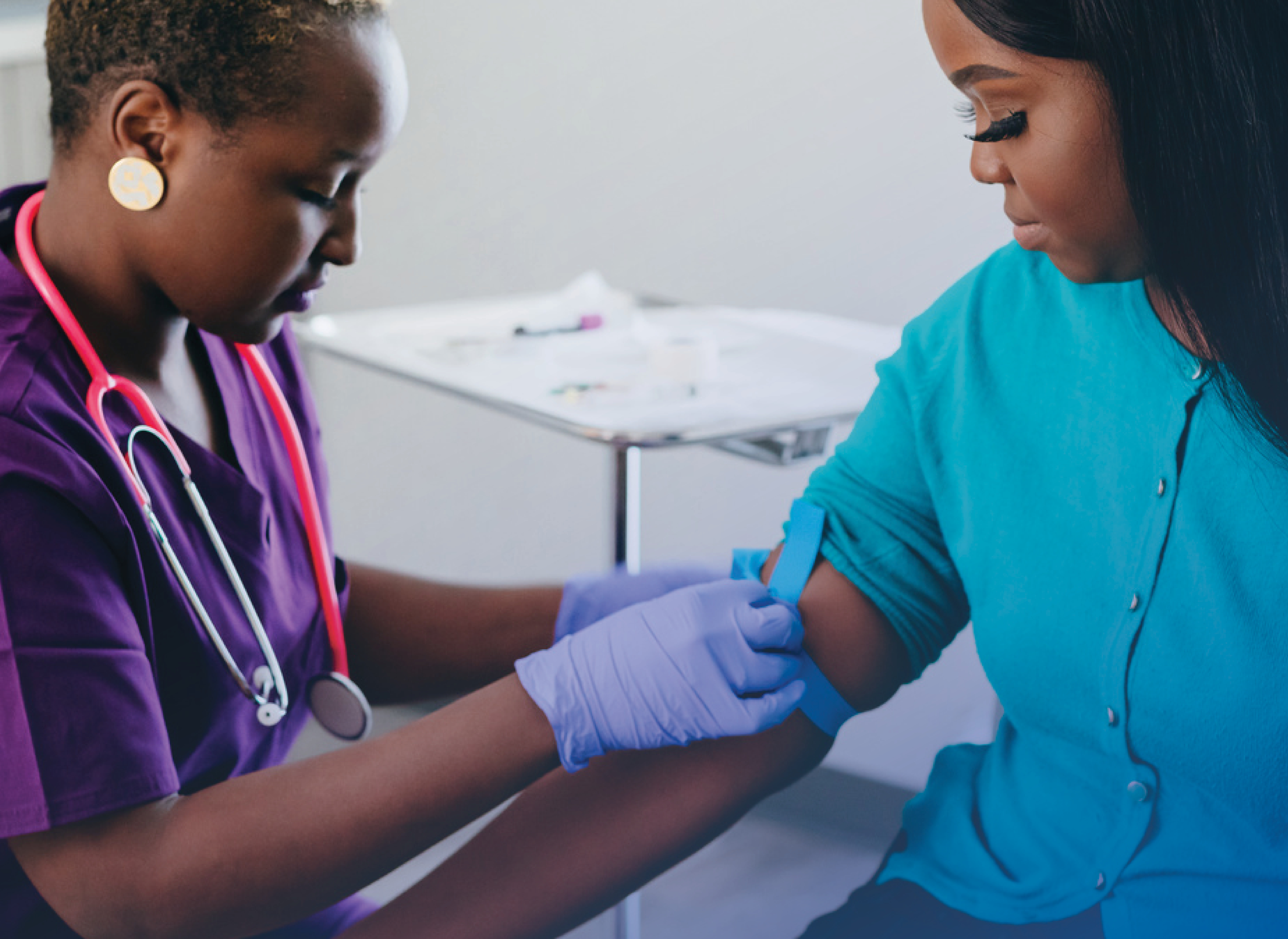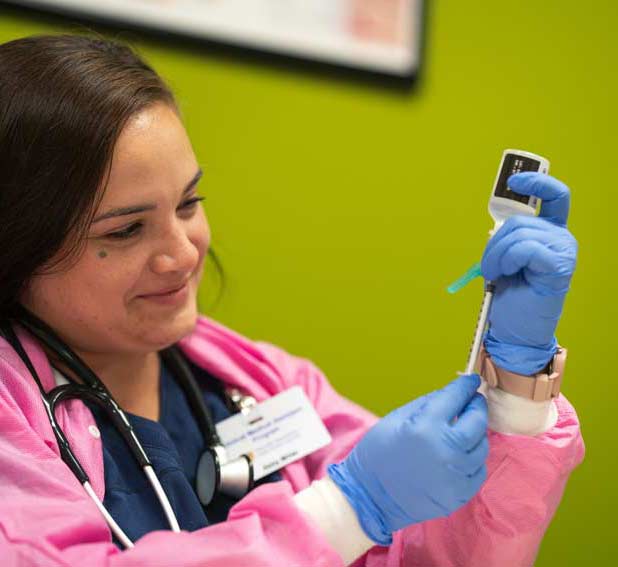Your Step-by-Step Guide to Starting Phlebotomy school With Confidence
Your Step-by-Step Guide to Starting Phlebotomy school With Confidence
Blog Article
The Path to Qualification: Comprehending the Phlebotomy Educating Course Journey and Its Significance
As you think about the course to accreditation in phlebotomy, it's crucial to understand the role you'll play in healthcare. Your training will cover important abilities, from blood collection strategies to patient interaction.

The Duty of Phlebotomists in Healthcare
Phlebotomists play a necessary role in the medical care system, functioning as the important web link in between individuals and essential analysis screening. You'll execute blood draws, making sure examples are collected properly and securely. Your expertise helps in detecting clinical conditions, checking health, and guiding treatment decisions.
In your daily communications, you'll require to develop trust fund with individuals, making them feel comfy throughout what may be a stressful experience. You're liable for identifying and handling examples carefully to stop contamination or errors, which can affect examination outcomes.
Past this, you'll typically work along with physicians and registered nurses, connecting important details regarding patients' problems. By grasping your skills, you contribute meaningfully to patient treatment, making you an essential part of the clinical team.
Overview of Phlebotomy Training Programs
When exploring phlebotomy training programs, you'll find different types developed to fit various timetables and learning styles. Each program aids you develop crucial abilities like blood collection and individual communication. Comprehending these alternatives is vital to picking the ideal path for your career.
Kinds of Training Programs
Numerous kinds of training programs are available for those aiming to end up being proficient in phlebotomy. You can pick from certificate programs, which typically last a few months and concentrate on vital skills. There are also diploma programs that provide a more comprehensive education and learning, typically lasting up to a year. If you're searching for a much deeper understanding, an associate level in an associated area might be the ideal fit. On the internet courses provide versatility for those balancing job or household dedications, permitting you to study at your very own speed. Additionally, some healthcare facilities and centers supply on-the-job training programs, providing useful experience while you find out. Whatever course you choose, each program aims to outfit you with the needed skills for a successful phlebotomy occupation.

Secret Abilities Established
Mastering phlebotomy needs a collection of crucial abilities that are developed via thorough training programs. You'll learn technological skills like correct blood vessel selection, needle insertion, and blood collection methods. These hands-on techniques ensure you can do procedures securely and effectively. In addition, communication abilities are fundamental; you'll need to interact with people, explain treatments, and put them secure. Recognizing makeup and physiology is important, also, as it assists you locate capillaries and recognize the body's feedback to blood attracts. Finally, you'll acquire expertise of security protocols and infection control, guaranteeing you keep a clean and sterile setting. Each of these abilities is essential for your success as a certified phlebotomist, making you a beneficial possession in any kind of health care setting.
Trick Elements of a Phlebotomy Course
In a phlebotomy program, you'll concentrate on important subjects that lay the groundwork for your future occupation. You'll take part in hands-on training that permits you to use what you have actually discovered in real-world settings. Both the curriculum and practical experience are essential for your success as a phlebotomist.
Curriculum Overview
While pursuing a phlebotomy training course, you'll run into a curriculum developed to outfit you with fundamental abilities and understanding. Phlebotomy Courses Near Me. This educational program typically includes anatomy and physiology, concentrating on the circulatory system and recognizing blood components. You'll additionally learn about different types of blood collection approaches, consisting of venipuncture and capillary slit techniques
Additionally, infection control and security methods are crucial components, ensuring you understand exactly how to keep a sterilized setting. You'll study patient interaction, highlighting communication and empathy, which are essential for reducing patient stress and anxiety. Finally, honest and lawful factors to consider will certainly be resolved, preparing you for real-world responsibilities. This foundational knowledge will certainly enable you to excel as a phlebotomist and offer quality treatment in clinical settings.
Hands-On Training Experience
Getting hands-on experience is an indispensable part of your phlebotomy training program. This practical training click here now permits you to apply what you've discovered in a real-world setting, improving your skills and self-confidence. You'll practice venipuncture techniques, discover exactly how to deal with different sorts of specimens, and get familiar with the equipment made use of in the field. Under the advice of seasoned trainers, you'll fine-tune your abilities, guaranteeing you're gotten ready for any kind of scenario you might deal with.
Furthermore, you'll obtain the possibility to engage with people, which is vital for developing your communication skills. This combination of technological effectiveness and social skills is important for your success as a certified phlebotomist. Ultimately, hands-on training is where theory satisfies practice, strengthening your knowledge and readiness for certification.
Accreditation and Licensing Requirements
Before you can begin your job in phlebotomy, it is vital to understand the qualification and licensing demands that differ by state. A lot of states call for phlebotomists to hold an accreditation from an identified organization, such as the National Phlebotomy Association or the American Culture for Professional Pathology. These accreditations normally involve passing a test that evaluates your expertise and skills in the area.
In enhancement to qualification, some states have details licensing requirements. You might require to finish a particular number of hours in medical technique, send proof of training, or undergo a background check. It is essential to investigate your state's guidelines to see to it you meet all needed criteria.
Staying informed regarding these requirements not just assists you safeguard a setting but likewise boosts your credibility as a specialist. By meeting these requirements, you'll be well on your means to an effective career in phlebotomy.
Hands-On Training and Practical Experience
Hands-on training and useful experience are necessary elements of your phlebotomy education, as they enable you to use academic expertise in real-world situations. During your training, you'll take part in supervised venipuncture, learn correct strategies, and end up being knowledgeable about various blood collection devices. This direct review participation is critical for constructing your self-confidence and sharpening your abilities.
You'll work closely with experienced professionals that can direct you through the subtleties of client communication and example handling. Each method session not only reinforces your understanding yet likewise prepares you for the fast-paced environment of medical care setups.
Furthermore, numerous programs include clinical turnings, permitting you to experience diverse setups, from health centers to outpatient centers. This direct exposure helps you adapt to different challenges and patient requirements, ensuring you're well-prepared for your future role. Accept these possibilities, as they're necessary to becoming a competent and compassionate phlebotomist.
Obstacles Faced During Training
While getting hands-on experience is vital, it is very important to recognize the challenges that can arise throughout your phlebotomy training. You might experience anxiousness when doing procedures on genuine patients, specifically if you're new to the atmosphere. The stress to get every little thing right can be overwhelming. Furthermore, mastering the skills required for blood attracts takes practice; you may battle with strategy at first.
Time management can likewise be an obstacle, as harmonizing concept, practical sessions, and individual dedications can feel daunting. You might deal with differing discovering paces amongst your peers, leading to sensations of self-doubt if you think you're falling behind. Adapting to the various characters of trainers can be difficult, as each may have an one-of-a-kind teaching style.
Identifying these challenges early can prepare you for success and assist you create durability throughout your training trip.
Profession Opportunities After Accreditation

As you obtain experience, you could also consider concentrating on areas like pediatric or senior citizen phlebotomy, accommodating specific person demands. Some phlebotomists choose to advance their occupations by coming to be lab specialists or seeking more education and learning in health care areas.
Additionally, your accreditation can cause roles in training or overseeing brand-new phlebotomists, enabling you to share your expertise. With the medical care sector consistently expanding, your skills will certainly constantly remain in demand, leading the way for a stable and meeting job. Accept the opportunities awaiting you!
Regularly Asked Questions
What Is the Normal Duration of a Phlebotomy Training Training Course?
Phlebotomy training courses normally last around 4 to eight weeks. You'll participate in hands-on method, class direction, and on the internet learning. Finishing this training prepares you for certification and a rewarding career in health care.
Are Online Phlebotomy Courses Available?
Yes, online phlebotomy training courses are readily available. They provide adaptability and benefit, allowing you to examine at your own speed. Simply confirm the program is accredited to fulfill qualification needs and obtain beneficial skills for your occupation.
Just How Much Does Phlebotomy Training Normally Price?
Phlebotomy training normally sets you back in between $700 and $2,500, depending on the program and area. You need to consider variables like training course length, consisted of materials, and hands-on experience when picking the right training for you.
What Prevail Prerequisites for Phlebotomy Training?
Common prerequisites for phlebotomy training frequently consist of a secondary school diploma or GED, immunizations, and a history check. Some programs may likewise call for fundamental healthcare expertise or accreditations, ensuring you're gotten ready for hands-on training.
Can I Function While Completing My Phlebotomy Training?
Yes, you can function while completing your phlebotomy training. Several check out here pupils equilibrium work with their research studies, however ensure to manage your time successfully to guarantee you meet both work and training commitments effectively.
Report this page